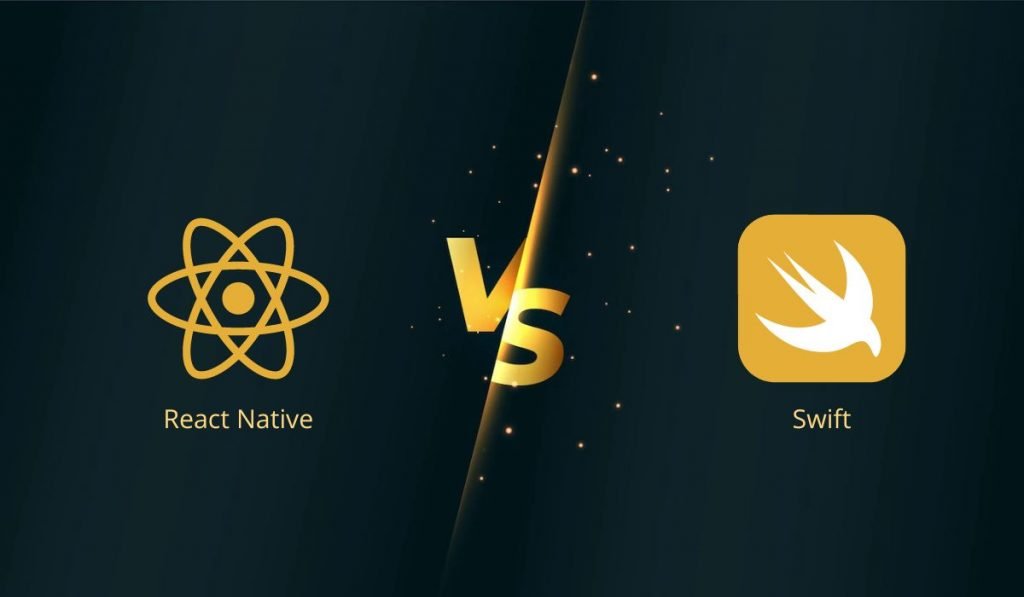The last decade has been about the development of mobile technologies and growth in the market share! Businesses are increasingly today dependent on mobile apps to interact with customers and simplify their operations. Some statistics indicate that the market will generate $1 trillion by 2023 in the mobile app development sector. Android is still holding a large chunk of the market share, but IOS is also steadily increasing the customer base.
Are you planning to build an app for your business? Looking for suggestions to enhance the entire reach of business through functional apps? React Native and Swift are the two most popular mobile development platforms to develop efficient apps as per the market demand. It is essential to know about the platform that suits your project needs and the blog will highlight the essential facts. Take the help of React Native app development experts to get a suitable app with an attractive user interface.

React Native & Swift are new technologies that simplify the mobile app development process. Swift was launched in 2014 and React Native in 2015 subsequently. Businesses need to address the requirement of IOS and Android-powered devices to attract relevant customers. React Native is acting as the mediator between the platform and the code. Swift is delivering the best results in handling apps with high graphics and heavy computational tasks. The selection of a relevant platform is critical to the correct development of the business app & within the stipulated time.
Table of Contents
- A Brief into React Native & Swift – Pros and Cons
- Tabular Comparison of React Native vs. Swift
- React Native vs. Swift – Platform Comparison for Your Next Project
- Conclusion!
A Brief into React Native & Swift – Pros and Cons
React Native is the app development framework ensuring the creation of cross-platform products using JavaScript. Swift is the other programming language meant for the development of IOS native apps with Objective C code. Both are having high demand among developers and the selection of platforms need to be done as per the future need.
What is React Native?
The JavaScript framework is created by the Facebook team for accelerating the mobile app development process. In terms of popularity, the use of JavaScript is way higher as compared to Swift or other platforms. Building apps with React Native is a cost-efficient option and allows simple penetration of the market. You can develop app with React Native that will be a functional app that addresses the demands of all. Let us look into the pros and cons of the app development framework. Reach out to React Native app development professionals to get functional apps as per the need.
Pros of React Native
- It assists the development of cross-platform apps. The leading framework is offering a cross-platform framework to get highly scalable apps.
- It ensures faster development of the app. The developers need to write 70% less code and the turnaround time for app building is less.
- It ensures code reusability. The developers can focus on platform-specific alterations and code reusability is applied to both mobile & website app development.
- It ensures low development costs. You can create one app for multiple platforms with React Native and thus project development cost gets lower. Reach out to preferable React Native app development experts to build cost-efficient apps.
Cons of React Native
- It is not the best option to get stable apps. React Native is not suitable for agile delivery or lean development.
- It faces trouble in debugging. It can be hard to debug the apps developed in native languages and developers can overcome it with third-party tools.
- It is a comparatively new framework. The platform is still improving as a language and thus can be maintained for a long time.
Also Read: Top 20 Python Development Companies
What is Swift?
It is the programming language created by Apple for developing native IOS apps. The development platform has drawn a lot of traction in the past few years and companies using Objective-C have switched to Swift for flexibility. The platform attracts more developers to IOS and enables the use of hardware features. Developers can leverage the use of Apple software to create advanced solutions with GPS, Bluetooth, Cameras, and others.
Pros of Swift
- It offers scalability. The LLVM compiler technology in the framework is helping the development of top-performing mobile apps at easy prices.
- It ensures code reusability. Hence, use the simple syntax to make readable programming languages and thus maintain them better.
- It ensures Automatic Memory Management. It is the function that ensures the creation of room for apps to run at their full potential.
Cons of Swift
- It has a limited talent pool. You will face difficulty in finding experienced Swift developers and a small number of experts have now taken up the task.
- The overall cost of development will be higher. Your app will cost higher now and businesses need to hire a new team for the app development platform.
Tabular Comparison of React Native vs. Swift
| React Native | Swift | |
| Development Speed | Faster for Android & low for IOS | Faster for IOS |
| UI/UX | Not preferable | Highly preferable |
| Development Cost | Relative low | Relatively high |
| Stability | Less stable | More stable |
| Documentation | Simple and Elegant | As per requirement |
| Development Cycle | Short | Long |
| Maintenance | Not very easy | Easy |
React Native vs. Swift – Platform Comparison for Your Next Project
User Interface
React Native is using JavaScript to leverage the internal APIs for running the native elements. It has no issues with displays on different screen sizes and one can build apps for iPhone & iPad at the same time.
Swift is having no trouble with integration into the IOS design and thus leveraging the UX principles becomes easier. Developers need to do coding from scratch while building Native Apps with Swift.
Coding Speed
Swift is using the legacy of Objective-C to get rid of flaws in the development process. It is the best option to build apps for IOS devices.
React Native is the framework simplifying the development of apps with fast code speed. It is a copy-paste process for the platform and developers save a lot of time.
Also Read: Top 10 Fastest Growing IoT Companies
Performance
The CPU consumption is highly efficient in Swift as compared to React Native. But, the Memory Usage and GPU speed of React Native are better than Swift.
React Native is better when it comes to CPU usage optimization, but it can be hard to deal with graphical works for the framework. The platform is enabling the developers to embed native code into the app to deal with different tasks.
Stability
React Native is not producing real native apps and rather leverages the internal APIs to make the app functional efficiently. It is an additional middle-man between the platform and code.
Swift is helping produce native apps and thus leverages all the possibilities possible for the development. So, It is performing better in dealing with graphical effects and thus Swift may be a better choice for you!
Community Support
JavaScript has a big community and thus you can get assistance for React Native development from experts from simple positing on the internet. But, finding the answer can be a hard task for some if you’re heading in the wrong direction. Developers can make use of the big community to solve the development issues.
Swift is having a small community and thus there are fewer helping hands for problems. But, the community is growing and is expected to reach higher numbers in a couple of years.
Also Read: Top 10 ReactJS Development Companies
Conclusion!
As you can understand from above, the performance of the app varies greatly with the selection of the app development framework. The project duration, cost of application, and the functions expected from the app will help decide on the relevant app development platform. Take the help of a mobile app development expert to understand the need & select the best development platform. Select the developers based on their experience and knowledge of using different frameworks for development.
FAQ’s
Swift leads because native development outperforms cross-platform development. Swift is ahead of the competition for dynamic, graphically-intensive apps.
While React Native can provide a decent native-like UI, it cannot achieve the same level of stability as Swift. You can use a native development language to take use of the device’s advantages and create a more stable and feature-rich application.










Leave a Reply